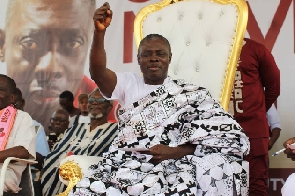- Home - News
- TWI News | TV
- Polls
- Year In Review
- News Archive
- Crime & Punishment
- Politics
- Regional
- Editorial
- Health
- Ghanaians Abroad
- Tabloid
- Africa
- Religion
- Election 2020
- Coronavirus
- News Videos | TV
- Photo Archives
- News Headlines
- Press Release
General News of Tuesday, 5 May 2009
Source: GNA
Rawlings calls for efficient land administration system at Berlin conference
Accra, May 5, GNA - Former President Rawlings has called for an efficient and decentralised land administration system in Ghana that will be responsive to the cultural needs of communities and withstand the test of time. He said the successful implementation of the Land Administration Project (LAP), which was instituted during the first National Democratic Congress (NDC) government, would lead to "a clear and coherent set of land administration policies and laws".
A statement issued in Accra on Tuesday by Mr Kofi Adams, an aide of the former president, said he was speaking to his peers at the African Presidential Roundtable conference in Berlin last week.
Former President Rawlings said: "Land administration in Ghana is bedevilled with the multiple sale of parcels of land by different parties claiming ownership of the same parcel of land, the poor use of compulsory acquisition powers by government agencies to acquire various tracts of land for which they are unable to pay compensation, weak management, both public and customary, and quite recently, the menace of land guards."
Organised by Boston University-based African Presidential Archives and Research Centre (APARC), the conference, was under the theme: "The Leadership Challenges of Land Reform in Africa". It was to commemorate the 125th anniversary of the Berlin Conference of 1884 which saw colonial powers partition Africa in what is popularly referred to as the Scramble for Africa. Former African leaders who participated in the conference included Tanzania's Ali Hassan Mwinyi, Aristides Maria Pereira of Cape Verde, Karl Auguste Offmann of Mauritius and Ghana's John Agyekum Kufuor. The rest are Frederick Sumaye of Tanzania, Nicephore Soglo of Benin, Sir Ketumile Masire of Botswana, Cassam Uteem of Mauritius and Festus Mogae of Botswana.
Former President Rawlings said in 2004, there were 66,000 land disputes before the law courts in Ghana resulting from the inability of traditional and customary authorities to identify the extent of land boundaries. The problem, he stated, had been caused by the plurality of land tenure and management systems in Ghana as they were poorly articulated and increasingly caused problems of contradiction and conflict. A communiquee issued at the end of the two-day conference said: "land reform, land restitution and land ownership are at essence a political problem continent-wide".
It said future formulas for land distribution, redistribution and ownership could not continue to reflect or perpetuate the legacy of colonialism, adding that land, and how it is used, managed and owned, had a direct correlation to poverty and wealth creation, food security and health, and development and economic growth. The communiquee also recommended that African governments must lead the way in initiating transparent public and private sector debate on land reform. It also called on Western governments and multilateral institutions to dedicate resources to facilitate land restitution and redistribution by acquisition, provide funds for titling process and land administration and development assistance to mitigate land degradation.
Financial institutions were called upon to develop affordable mortgage facilities, encourage borrowing and support economic literacy initiatives. The communiquee also charged such institutions to offer macro and micro credit as well as building business capacity in the nations with an eye towards long-term stability. The media, universities and colleges, NGOs and Civil Societies as well as religious organisations were all tasked to play a role in educating, researching and cultivating a culture of work, sacrifice and savings to ensure that land reform initiatives achieve their goals.










